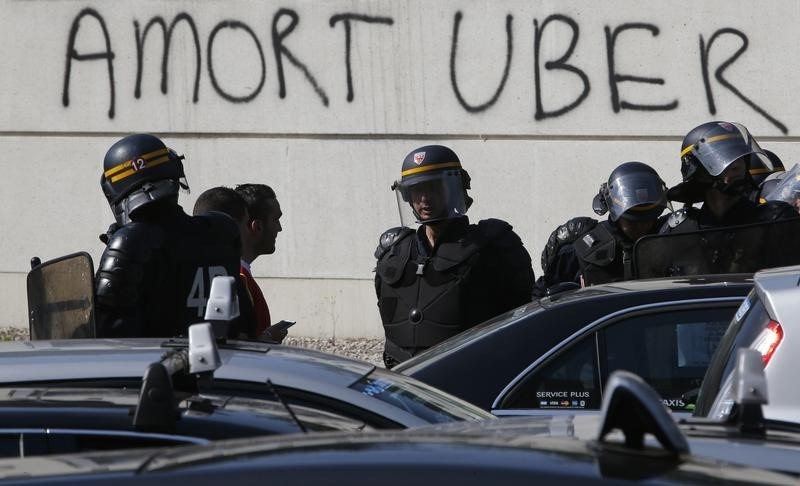By Emile Picy and Leila Abboud
PARIS (Reuters) - France's Constitutional Court upheld a national law that banned one of Uber Technologies' car services that relies on non-professional drivers using their own vehicles, dealing another setback to the company in Europe.
Uber had challenged the legality of a law passed by the French government last year, which banned its so-called UberPOP service and updated rules on how taxi companies and chauffeured cars could compete.
"The Constitutional Court rejects all the arguments raised by the company and declares the contested parts of the law as conforming with the Constitution," the court said.
"While this is a disappointing judgement for Uber, Heetch and other French ride-sharing companies, it will not impact the service we offer in France today which is provided entirely by professional drivers," Uber said in response.
"We will continue to work with the French government on new, commonsense regulations that offer riders more affordable, reliable options and drivers new job opportunities."
Uber had already suspended the UberPOP service in France in July after particularly violent protests by taxi drivers and the detention of two of its French executives by prosecutors.
The decision could affect a separate criminal case against the two executives, Thibaud Simphal and Pierre-Dimitri Gore-Coty, that is set to go to trial September 30.
Courts in Italy, Spain and Germany have already outlawed UberPOP, siding with taxi companies that argued that the service did not conform with local transportation rules. Further legal challenges are pending in the Netherlands and Belgium.
As a result of the setbacks, Uber has begun to concentrate its efforts in Europe on the more traditional car and driver services, which are staffed by professional drivers and are usually covered by national laws on taxi operators.
Thomas Meister, a spokesman for Uber, said the laws governing transportation services in much of western Europe dated back to the 1960s and were less flexible than in places that have updated theirs such as the United States or Mexico.
"It's inevitable that ride-sharing and car-pooling services will become more common in Europe, but it is just going to take longer than elsewhere," he said before the court's pronouncement.
Uber has tried to take the fight to Brussels by challenging the national laws, and lobbying for more favourable treatment.
Born out of the frustration of two Silicon Valley entrepreneurs trying to catch a cab in Paris, Uber's services have mushroomed since being launched in 2010 and are now offered in nearly 270 cities worldwide.
International expansion in Asia, Europe, and Latin America is key to the future of Uber, which is valued at more than $40 billion, making it the world's most highly valued venture capital-backed start-up.

Its investors include Goldman Sachs (NYSE:GS), Google (NASDAQ:GOOGL) and venture funds Benchmark and Kleiner Perkins Caufield & Byers.